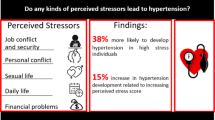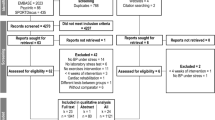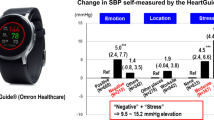Abstract
Previous studies have reported an increased risk of developing sustained hypertension (SH) in borderline or mildly hypertensive subjects showing an exaggerated response of blood pressure (BP) to mental stress. The aim of this study was to assess if the response of BP to mental stress tasks is an independent predictor of SH. A total of 89 patients with grade 1 hypertension, aged 18–64 years, 62% males, were included. The mean of follow-up was 5.3 years (s.d. 2.1 years). SH was defined as the development of grades 2–3 hypertension (Systolic BP≥160 mmHg or diastolic BP≥100 mmHg) or to be in antihypertensive treatment after follow-up. Two mental stress tasks: mental arithmetic stress task and a stressful interview (SI) were applied at entry. The subjects were classified as hyper-reactors when BP increase was greater than 35 mmHg for systolic BP or greater than 21 mmHg for diastolic BP, according to the results obtained previously in a normotensive control group. In the univariate analysis, the factors associated with the development of SH were age (P=0.0007), office diastolic BP (P=0.014) and hyper-reactivity of BP during a stressful interview (P=0.003). In the Cox regression model, after adjusting for gender, age, and office BP, the hyper-reactivity of BP during SI was an independent predictor of development of SH. In conclusion, the response of BP to mental stress tasks is useful in predicting SH in young and middle-aged subjects with grade 1 hypertension.
This is a preview of subscription content, access via your institution
Access options
Subscribe to this journal
Receive 12 digital issues and online access to articles
$119.00 per year
only $9.92 per issue
Buy this article
- Purchase on Springer Link
- Instant access to full article PDF
Prices may be subject to local taxes which are calculated during checkout



Similar content being viewed by others
References
Horan MJ, Lanfant C . Epidemiology of blood pressure and predictors of hypertension. Hypertension 1990; 15 (Suppl. 1): I-20–I-24.
Skarfors ET, Lithell HO, Selinus I . Risk factors for the development of hypertension: a 10-year longitudinal study in middle-aged men. J Hypertens 1991; 9: 217–223.
Leitschuh M et al. A. High-normal blood pressure progression to hypertension in the Framingham Heart Study. Hypertension 1991; 17: 22–27.
Vasan RS et al. Assessment of frequency of progression to hypertension in nonhypertensive participants in the Framingham Heart Study: a cohort study. Lancet 2001; 358: 1682–1686.
Jamerson K, Julius S . Predictors of blood pressure and hypertension. General principles. Am J Hypertens 1991; 4: 598S–602S.
Watt GCM, Foy CJW, Holton DW, Edwards HE . Prediction of high blood pressure in young people. J Hypertens 1991; 9: 55–58.
Hunt SC, Stephenson SH, Hopkins PN, Williams RR . Predictors of an increased risk of future hypertension in Utah. A screening analysis. Hypertension 1991; 17: 969–976.
Nakanishi N et al. Risk factors for the development of hypertension: a 6-year longitudinal study of middle-aged Japanese men. J Hypertens 1998; 16: 753–759.
Shapiro AP . Hypertension and Stress. A Unified Concept. Lawrence Erlbaum Associates: Mahwah, NJ, 1996.
Bedi M, Varshney VP, Babbar R . Role of cardiovascular reactivity to mental stress in predicting future hypertension. Clin Exp Hypertens 2000; 22: 1–22.
Pickering TG, Gerin WG . Cardiovascular reactivity in the laboratory and the role of behavioral factors in hypertension: a critical review. Ann Behav Med 1990; 12: 3–16.
Falkner B, Onesti G, Hamstra B . Stress response characteristics of adolescents with high genetic risk for essential hypertension: a five-year follow-up. Clin Exp Hypertens 1981; 3: 583–591.
Falkner B, Kushner H, Onesti G, Angelakos ET . Cardiovascular characteristics in adolescents who develop essential hypertension. Hypertension 1981; 3: 521–527.
Borghi C, Costa FV, Mussi A, Ambrosioni E . Predictors of stable hypertension in young borderline subjects: a five-year follow-up study. J Cardiovasc Pharmacol 1986; 8 (Suppl 5): S138–S141.
Borghi C et al. Factors associated with the development of stable hypertension in young borderline hypertensives. J Hypertens 1996; 14: 509–517.
Light KC, Dolan CA, Davis MR, Sherwood A . Cardiovascular responses to an active coping challenge as a predictors of blood pressure patterns 10 to 15 years later. Psychosom Med 1992; 54: 217–230.
Murphy JK, Alpert BS, Walker SS . Ethnicity, pressor reactivity, and children's blood pressure: five years ob observations. Hypertension 1992; 20: 327–332.
Matthews KA, Woodall KL, Allen MT . Cardiovascular reactivity to stress predicts future blood pressure status. Hypertension 1993; 22: 479–485.
Markovitz JH et al. Cardiovascular reactivity to video game predicts subsequent blood pressure increases in young men: the Cardia Study. Psychosom Med 1998; 60: 186–191.
Carroll D et al. Pressor reactions to psychological stress and prediction of future blood pressure: data from the Whitehall II Study. BMJ 1995; 310: 771–776.
1999 World Health Organization-International Society of Hypertension. Guideliness for the Management of Hypertension. J Hypertens 1999; 17: 151–183.
Armario P et al. Blood pressure response to mental stress in young subjects with high or slightly high blood pressure. Does it reflect the changes in blood pressure observed during outpatient monitorization? Med Clin (Barc) 1994; 102: 547–652. [in Spanish].
Armario P et al. Relationship between cardiovascular reactivity to mental stress and early target organ damage in untreated mild hypertension. Hospitalet Study. Med Clin (Barc) 1999; 113: 401–406. [in Spanish].
Light KC et al. High stress responsitivity predicts later blood pressure only in combination with positive family history and high life stress. Hypertension 1999; 33: 1458–1464.
Linden W, Earle TL, Gerin W, Christenfeld N . Physiological stress reactivity and recovery: conceptual siblings separated at the birth. J Psychosom Res 1997; 42: 117–135.
Köhler TH, Fricke M, Ritz Th, Scherbaum N . Psychophysiological reactivity of borderline hypertensives and their recovery after mental stress. Psychother Psychosom 1997; 66: 261–267.
Guasti L et al. Reactivity of blood pressure to mental arithmetic stress test stress-test, recovery time, and ambulatory blood pressure in hypertensive and normotensive subjects. Blood Press Monit 1998; 3: 275–280.
Author information
Authors and Affiliations
Corresponding author
Rights and permissions
About this article
Cite this article
Armario, P., del Rey, R., Martin-Baranera, M. et al. Blood pressure reactivity to mental stress task as a determinant of sustained hypertension after 5 years of follow-up. J Hum Hypertens 17, 181–186 (2003). https://doi.org/10.1038/sj.jhh.1001530
Received:
Revised:
Accepted:
Published:
Issue Date:
DOI: https://doi.org/10.1038/sj.jhh.1001530
Keywords
This article is cited by
-
Pre-anesthesia systolic blood pressure increases with age regardless of sex
Journal of Anesthesia (2012)



